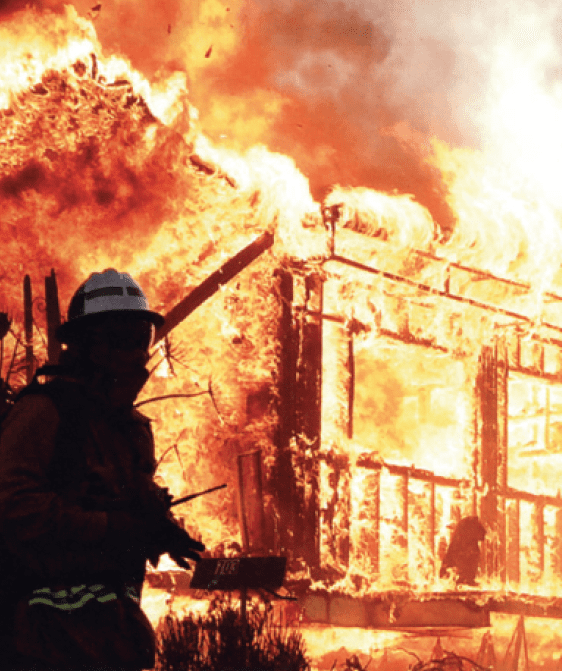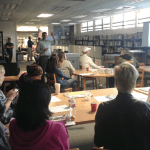With Santa Ana winds in full swing, there’s no time like the present to make sure the community is prepared for a natural disaster.
More than 30 people joined together in the library at Malibu High School on Thursday to discuss the topic, as representatives from the Malibu/Lost Hills Sheriff ’s station, Los Angeles County Fire Department, Arson Watch and the City of Malibu joined Malibu Emergency Services Coordinator Brad Davis for a group discussion on being prepared in the event of a disaster.
“We don’t want anybody to panic,” Davis said. “[But] people are going to panic. We don’t want them to do the wrong thing.”
In a place geographically isolated from easier access to disaster services, Davis stressed the importance of having a plan. Important documents should be scanned onto a disc and kept somewhere safe, non-perishable emergency supplies should be kept in accessible storage containers, and close friends and family should know evacuation plans.
“Our yearly enemy is fire. The one that’s really going to be the great leveler is the earthquake, when the San Andreas Fault breaks,” Davis said. “It’s going to take out the water and the gas … we’re talking three or four months without water or electricity.”
Fire Station 71 Capt. Steve Ralston reminded the group that making the effort of “clearing your property of any brush will give firefighters a better chance to save your house.”
“If there’s a decision on when to leave, go early,” Ralston said. “Don’t wait, just go. Time spent prepping ahead goes a long way.”
Kirby Kotler, representing the Arson Watch team, stressed the importance of being prepared for anything.
“We have the best firefighters in the world,” Kotler said. They know what’s going on. I’m asking you to get involved. Everyone needs to get educated. We have 43 parents that have taken our CPR class. Don’t wait for someone to call 911 if there’s an emergency – be that person that can help.”
Local law enforcement officials reminded the group that when a situation arises, being prepared for any kind of disaster can help lower levels of fear and panic.
“There are situations where we will only let certain residents in,” Deputy Dave Diestel said after a resident asked about vehicle access in and out of Malibu during an emergency. “We will work with you. Those opening minutes … seconds where there’s mass hysteria, we will try and work with you.”
Sheri f f ’s deputies work closely with multiple agencies to relay vital information to different points of contact, ensuring the community is safe and also informed during an emergency situation. Each station is equipped with the necessary tools to effectively assist the public via an Emergency Operations Center.
The center works as a main hub during a crisis, with multiple stations designed to communicate a master emergency plan on a broader scale. Maps, computers, battery-operated radios and satellite phones help Sheriffs coordinate with every agency assisting the disaster without using already existing resources designed for any other existing emergency.
“It’s critical during disasters that all agencies, cities and the community members work together in a coordinated fashion,” Lt. Jim Royal with the Malibu/Lost Hills station said. “Law enforcement during a disaster deals with evacuations and crime prevention. We, along with California Highway Patrol (CHP), do traffic control.”
Sheriffs will work alongside LA County Fire, CHP, the Red Cross, Animal Control services, Caltrans and city contacts to evacuate, secure animals and provide further community support.
“A big part of emergency preparedness is disaster communications ability,” Royal said. “All involved agencies work together to ensure effective coordination and communication abilities.”
Malibu High Principal David Jackson told the group that his students’ safety and protection are his top priority.
“If there’s something happening in Malibu and I’m not there, I’m heading here. As administrators, we know what to do. If the phones go down, we have satellite phones that can connect,” he said.
Jackson informed the group that heading toward the beach is the first contingency plan in case of a fire near the school. Diestel agreed and assured the group that “we absolutely have a plan and place to put them.
“Your kids aren’t going anywhere until they are safe,” Jackson said. “You’ll get emails, texts … everything. That’s the only time I will release your kids, once they are safe.”
Along with multiple notification alert systems through emails, texts and even social media, Davis has been building an arsenal of volunteers ready to help at any notice of disaster.
“We have a [Community Emergency Response Team] of between 30-60 residents that are disaster service workers,” Davis said. “The team is responsible for disaster supplies. Out of that, I’m handpicking a small crew who know how to handle social media and monitor services for us.”
Officials also encouraged participants to begin using the City of Malibu’s web-based alert system that sends notifications directly to your cell phone or email.
“We notify of these things,” Media Information Officer Matt Myerhoff said. “If we do have any true emergencies, it could make a huge difference.”
To sign up for alerts, visit MalibuCity.org.


